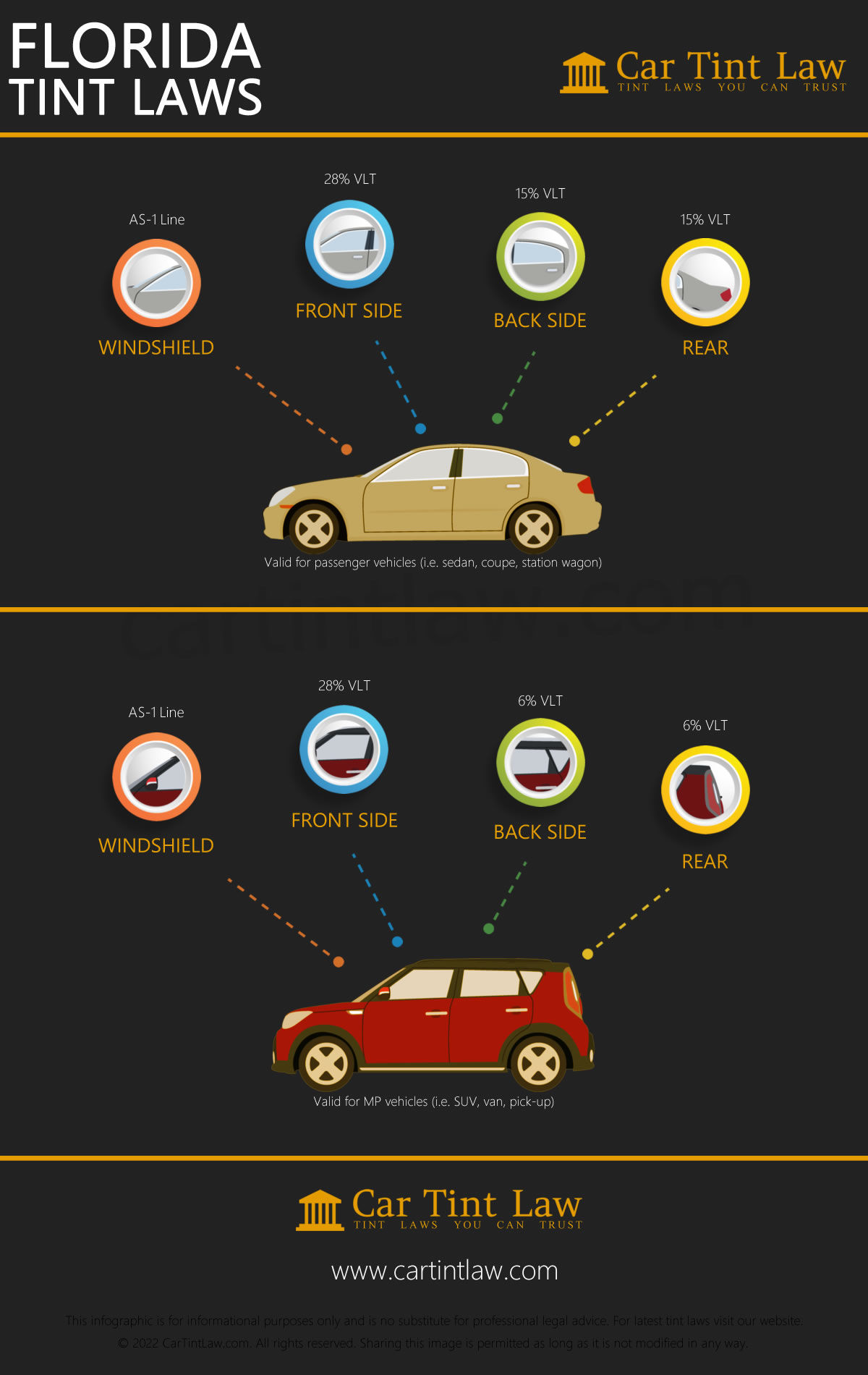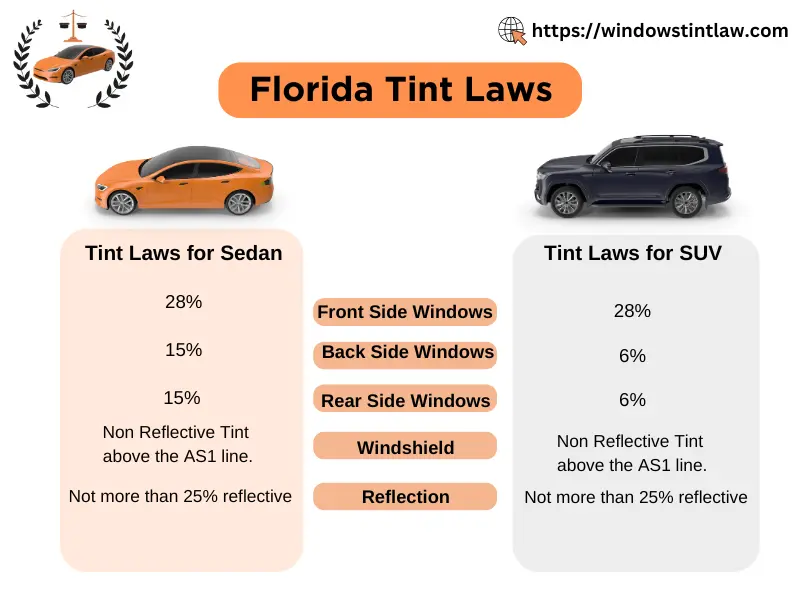No, mirror tint is not legal in Florida. The state has specific laws regulating window tinting to ensure safety.
Violating these laws can lead to fines and vehicle inspection issues. Understanding window tint laws in Florida is essential for any car owner. The state enforces strict regulations to maintain road safety and visibility for all drivers. Many people consider tinting their car windows for privacy and protection from the sun.
But not all types of tinting are permitted. Mirror tint, in particular, is often misunderstood. This blog post will clarify the legalities around mirror tint in Florida. We’ll explore what the law says and why it matters for your vehicle’s compliance and your safety. Stay informed to avoid penalties and keep your car within legal limits.
Introduction To Mirror Tinting
Mirror tinting is a popular choice for many car owners. It offers a sleek, reflective look that stands out. But what exactly is mirror tint, and what are its benefits?
What Is Mirror Tint?
Mirror tint is a type of window film. It has a reflective surface. This surface gives a mirror-like appearance. The tint is applied to the inside of car windows. It helps reduce sunlight and glare.
Benefits Of Mirror Tint
There are many benefits to using mirror tint. Here are some of the key advantages:
- Privacy: Mirror tint prevents people from seeing inside your car.
- Heat Reduction: It blocks out a significant amount of sunlight. This keeps the car cooler.
- Glare Reduction: It reduces glare from the sun and headlights. This makes driving safer.
- UV Protection: It blocks harmful UV rays. This protects your skin and your car’s interior.
Using mirror tint can enhance your driving experience. It offers privacy, comfort, and protection.
Florida Tint Laws Overview
Understanding Florida’s tint laws can be challenging. The state has specific rules for car windows. Following these laws ensures you avoid fines and drive safely.
Legal Limits For Tint Darkness
Florida law sets limits on how dark your car window tint can be. For sedans, the front side windows must allow more than 28% of light in. The back side windows and rear window must let in more than 15% of light.
SUVs and vans have different rules. The front side windows must also allow more than 28% of light. The back side windows and rear window can be darker, but must still let in more than 6% of light.
Reflectivity Restrictions
Window tint can also reflect light. Florida law limits this reflectivity. The front side windows can be up to 25% reflective. The back side windows can be up to 35% reflective.
Reflective tint can reduce glare and heat. But, too much reflectivity can be dangerous. It can make it hard for other drivers to see.
Specifics Of Mirror Tint Regulations
Florida has specific laws about window tinting. These rules ensure safety and visibility. Knowing these laws can help avoid fines. This guide explains the key points.
Allowed Reflectivity Percentage
In Florida, the law sets the reflectivity limits. For the front side windows, the tint can’t be more than 25% reflective. For the back side windows, the reflectivity limit is 35%. These percentages help drivers see clearly and keep the roads safe.
Window Placement Rules
Different windows have different rules. The front windshield can only have tint on the top section. This section should be above the AS-1 line. The front side windows must allow over 28% of light in. The back side and rear windows must allow more than 15% of light in. These rules ensure that the driver maintains good visibility.

Credit: www.reddit.com
Exceptions And Special Cases
In Florida, mirror tint laws can be complex. While there are strict regulations, certain exceptions and special cases allow some flexibility. These provisions ensure that specific needs and circumstances are considered.
Medical Exemptions
Individuals with certain medical conditions can apply for a medical exemption. This exemption permits them to use darker window tints. Conditions such as lupus, albinism, and photosensitivity are recognized. The process involves:
- Obtaining a medical certificate from a licensed physician.
- Submitting the certificate to the Florida Department of Highway Safety and Motor Vehicles (FLHSMV).
- Receiving an exemption sticker for the vehicle.
Important: Always keep the exemption certificate in the vehicle. This ensures you are prepared for any roadside inspections.
Commercial Vehicle Rules
Commercial vehicles have different regulations compared to personal vehicles. The rules for commercial vehicles include:
| Vehicle Type | Window Tint Regulation |
|---|---|
| Trucks | Front side windows: 28% VLT Rear side windows: No restrictions |
| Buses | Front side windows: 28% VLT Rear side windows: No restrictions |
| Vans | Front side windows: 28% VLT Rear side windows: No restrictions |
These regulations ensure safety and visibility for drivers and law enforcement. Always check the specific rules for your vehicle type.
Penalties For Non-compliance
Penalties for non-compliance with Florida’s mirror tint laws can be serious. Understanding these penalties can help you avoid hefty fines. It’s important to follow the rules to keep your vehicle street-legal.
Fines And Tickets
Ignoring the mirror tint laws in Florida can lead to fines. You may get a ticket if your tint is too dark. The first offense usually results in a warning or a small fine. Repeat offenses can result in higher fines. The fines can add up quickly and become a financial burden.
Vehicle Inspection Failures
Your vehicle might fail inspection due to illegal tint. Inspection failures can prevent you from renewing your registration. This could mean more fines and even the inability to legally drive your car. Removing or replacing illegal tint can be costly and time-consuming.

Credit: www.cartintlaw.com
Tips For Legal Tinting
Are you considering adding mirror tint to your car windows in Florida? It’s essential to stay within the legal limits. You can avoid fines and keep your vehicle looking great by following these tips for legal tinting.
Choosing The Right Tint
First, know the legal limits. Florida law allows a maximum of 28% VLT (Visible Light Transmission) for the front side windows. The back side windows and rear window can have 15% VLT. This means they can be darker. Ensure you select a tint that meets these standards.
To help you choose the right tint, consider the following:
- Check the VLT percentage before purchasing.
- Ensure the tint has UV protection.
- Opt for high-quality materials for durability.
Choosing the right tint ensures you stay within legal limits and protect your car.
Professional Installation
Hiring a professional installer can save you time and trouble. They know the local laws and have the right tools and experience. Here’s why you should consider professional installation:
- They use high-quality tint film.
- They ensure no bubbles or creases.
- They offer warranties on their work.
While it may be tempting to install the tint yourself, professionals guarantee a clean and legal finish.
In summary, choosing the right tint and opting for professional installation helps you comply with Florida’s tint laws. It also ensures your vehicle looks great and stays cool.
Removing Or Adjusting Illegal Tint
Driving with illegal window tint in Florida can result in fines. It’s important to know how to remove or adjust your tint to avoid legal trouble. Below are some steps to help you stay compliant with Florida’s tint laws.
When To Remove Tint
You need to remove your window tint if it exceeds the legal limit. Florida law states that the front side windows must allow more than 28% of light in. The rear side windows and back window must allow more than 15% of light in for cars. For SUVs and vans, the rear side windows and back window must allow more than 6% of light in.
If you have received a ticket for illegal tint, you should remove it immediately. This will help you avoid further fines. Also, if your tint is peeling or bubbling, it is time to remove it. Poor quality tint not only looks bad but can also obstruct your vision.
How To Adjust Tint Legally
First, check the current tint levels on your windows. You can use a tint meter to measure the Visible Light Transmission (VLT) percentage. If the VLT is below the legal limit, you need to adjust your tint.
Next, visit a professional tinting service. They can replace your illegal tint with a legal one. Make sure they use high-quality film that complies with Florida laws. Always ask for a warranty on the new tint to ensure it lasts.
If you prefer to do it yourself, follow these steps:
- Remove the existing tint using a heat gun and a scraper.
- Clean the window thoroughly to remove any adhesive residue.
- Apply the new, legal tint film to the window.
- Use a squeegee to remove air bubbles and ensure a smooth finish.
Remember, driving with legal tint keeps you safe and avoids fines. Always stay informed about the local tint laws to ensure compliance.

Credit: windowstintlaw.com
Frequently Asked Questions
Is Mirror Tint Allowed In Florida?
Mirror tint is not allowed on the front side windows in Florida. It must reflect no more than 25% of light.
What Are Florida’s Window Tint Laws?
Florida law permits a maximum reflectance of 25% on front side windows and 35% on rear windows.
Can I Get A Ticket For Mirror Tint In Florida?
Yes, you can get a ticket for having illegal mirror tint on your vehicle windows in Florida.
What Are The Penalties For Illegal Tint In Florida?
Penalties for illegal tint in Florida can include fines and a requirement to remove the tint immediately.
Conclusion
Mirror tint laws in Florida are strict. Knowing these rules helps avoid fines. Legal limits exist for your safety. Stay informed about the latest regulations. This ensures your car stays compliant. Always consult local authorities for updates. Legal tints offer privacy and protection.
Choose wisely to stay within the law. Safe driving is always the priority.

My name is Carson Mackey and I specialize in mirror/glass. With over 8 years of experience in the glass/mirror industry, I am well-versed in all aspects of fabrication, repair and installation. I take great pride in providing my clients with the best quality of service and products. I am passionate about my work and strive to help my clients realize their vision.
Honestly, I am dedicated to providing the best services and products to my customers and I’m always open to learning new techniques and working with advanced materials. Basically, this is a place where I will share my thoughts and experiences on Mirror. And this website (http://mirrortopics.com) is an outlet of my deep passion for Mirror.
I want to clear about MirrorTopics that it’s not any agent or hired organization. It fully customize by me. So I hope, posted information will Realistic and authentic. Although I will do enough research before posting but if you notice any wrong or mistake on my article, please contact with me without any hesitation. As well as you can suggest me about content quality, authentication and so on by using our Contact US page. Thank you my friend to support me.
